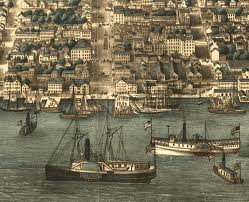
![]()
Index • |
Welcome • |
About
Us • |
21st Century • The Future |
World
Travel • Destinations |
Reviews • Books & Film |
Dreamscapes • Original Fiction |
Opinion
& Lifestyle • Politics & Living |
Film
Space • Movies in depth |
Kid's
Books • Reviews & stories |
Dreamscapes Two • More Original Fiction |
The International Writers Magazine: Egypt
Egypt: A Revolutionary Welcome
• Romina de Oliveira
My invitation to Egypt from my university friend Kevin, was long overdue, so I finally took up the offer and decided to take advantage of my visit to travel around the country. It was my first visit to an Arab country so I was a touch apprehensive, especially as I was a female travelling alone.
The blogs I’d read of other women’s travels to Egypt did little to comfort me. My friends were a little concerned for my safety and believed that I would be made to feel a little unwanted in the country especially as Mubarak had stepped down four months before. Nevertheless, I was not unfamiliar with solitary travel and my enthusiasm superseded my worries.
Kevin had forewarned me that I would experience hassle in Luxor, especially as a female tourist, so during my flight I rehearsed my savvy air. Luckily, it seemed that my acting skills had paid off as I was left in relative peace, and even frequently spoken to in Arabic, given that I’d covered my hair and dressed “conservatively”.
Despite this I was rather dubious about visiting the Ancient Egyptian monuments in Luxor, as I was certain that I would be overcharged and left to feel a little foolish. However people were in fact extremely helpful. I even managed to acquire an unofficial bodyguard whilst exploring the Valley of the Kings, who averted any wisecracking male. This was far from the intimidating behaviour I had read about. Later I even acquired a “chauffeur” – official this time – and happened to be the cousin of my unofficial bodyguard. As we cruised around Luxor I attempted to read the graffiti from the uprisings, but my Arabic was not quite up to this artistic writing style. By the end of the day I’d befriended my chauffeur, Mahmoud, burly yet incredibly mellow voiced man. He invited me the next day to his family run guest house on the West Bank for some Egyptian tea, which rivals the British tea institution. Perhaps he was a little concerned about leaving me to wander the Luxor streets alone, but I felt that this was a genuine invite rather than trying to save a damsel in distress.
Over some delicious mint tea, we discussed a violent clash that had taken place in Cairo a couple of days before, between Christians and Muslims. His anger at the event was evident and he kept insisting that this was utterly unrepresentative of the harmonious interaction between faiths in Egypt. As I contemplated Mahmoud’s words, peacefully watching over the Nile at the hustle and bustle of the East Bank, I was saddened that such a violent embroilment had taken place after such a glorious moment for Egypt.
Mahmoud’s hospitality was heart warming and I was starting to find Egyptians lovable. I was treated so well it was easy to forget that I had only met Mahmoud the day before. However I had to accustom myself to this as it was a sign of things to come. My train journey to Alexandria presented this perfectly. I was travelling to the Mediterranean city where I was going to stay with a host family I had met on Couchsurfing.
My twelve hour night journey is one I will always have fond memories of, despite not sleeping, having numb limbs throughout and a small child dribble on my shoulder whilst I enviously watched him sleep. But these trivialities were pushed aside, as my fellow travellers’ generosity and friendliness took over as the sun rose and I breakfasted on their donations of tea, banana and biscuits. Irrespective of my linguistic limitations, I still felt I shared something with the passengers in my carriage. For a minute I felt that this was a fraction of the sense of unity that emerged during the revolution. In the carriage I watched people old and young converse and laugh together despite being strangers, several hours before.
Before my feet even had the chance to firmly settle on Alexandrian soil, I was given an unprecedented welcome, I had to pinch myself to realise that they weren’t my own family. Their kindness and honesty often made me forget that several months before they had lived through a tense political struggle. The parents – Nour and Karim – were born and raised in Alexandria, and never wanted to leave. As my stay in the city went by I utterly empathised. As we zigzagged through the enchanting market streets of Alexandria, although filled with women frantically purchasing before the day ended, I didn’t feel the stress and hostility of larger cities. Over the sea of women, stalls selling Egyptian, Palestinian and Libyan flags were commonplace. I liked to think that perhaps as an act of solidarity, Arabs had created their own “Arab league”. Egyptians often projected the same sense of pride about their own victory onto the other struggles in the Arab world.
More travel
Aside from this political air of suspense hanging over Egypt, Alexandria captured my heart. All the while respecting the grandeur of the old mosques dotted around, I found the city to be vibrant and youthful. So much so that whilst visiting the Montaza Palace and Fort Qaitbey, built upon the remains of Lighthouse of Alexandria, it appeared as if entry was limited to under 30s. In particular, courting couples, which made me a feel a little uncomfortable until Nour and Fatima, her eldest daughter, admitted that their favourite past time was to sit next to couples and ruin the romantic moment. I confess that this was in fact quite fun. Chatting with the young mother of three in the Palace garden’s made me realise how much of an inspiration to women she was. She worked full time, spoke impeccable English and always held valuable opinions, which lays to rest stereotypes of docile Arab women. On top of this, she always had time for her family and for me, a stranger. I had caught the classic traveller’s bug whilst staying with them, and I couldn’t have asked for a better nurse.
Having extended my stay in Alexandria I was sad to leave the city. Despite Nour’s daughter’s being in their exam period I’d stayed up late nights with them and we’d struck up a genuine friendship. I was really touched by the family’s hospitality towards a complete stranger. But Cairo was my next destination where I would meet Kevin.
After an hour disconcertedly attempting to find my way out of the dusty train station and an extortionate un-metered taxi journey to the northern side of Cairo, I finally met Kevin and some friends in a rather chic sheesha cafe. As we sipped on fresh juices and we reminisced over old times, the conversation soon turned to the groups experiences during the uprisings. It all sounded a little surreal like something out of Hollywood blockbuster, especially as Kevin explained that he had been “evacuated” from Egypt in a private blacked out car. Kevin was completing a two year teaching contract in Cairo, at an English language school. I was concerned that he would encounter hostility in Cairo, as he was a gay man, but I was particularly pleased to hear that he had now started to call the city “home”. He even assured me that the gay scene in Cairo was booming. Before my visit I would never have imagined partnering homosexuality with the Arab world.
In Cairo most of my time was spent smoking sheesha, drinking tea and sampling Egypt’s culinary delights in various locations around the city. Maybe Gavin had told his friends a fair deal about me, but they way they interacted with me was as if I had known them for several months. They were keen for me to see the “real” Egypt and took me to local hotspots. Kevin had a busy work schedule so I often was accompanied by his generous friends. I was even taken on a personal tour of Tahrir Square, by Ayaat and Hazem. They lucidly recounted where they joined hands around the Egyptian museum during the unrest to protect it from pro-Mubarak supporters. Opposite the museum, which inside resembles more of a collector’s garage, stands a dramatically charred building. As we found a resting spot on the grass they explained that this was once the interior ministry building. As I observed the air conditioning units hanging by a wire from the blackened building, I remembered what people had warned me of and what I had read before I came to Egypt. They couldn’t have been more wrong. On a personal level, it was the perfect time to visit the country and although this was my first visit I felt that those I had met, I had known for a long time.
The warmth that I felt in Egypt was truly inspiring. My meagre words were not enough to thank those who had sincerely made me feel welcome in their country in spite of the uprisings. Although I certainly identified a political air of doubt in Egypt, I believe that people’s hope and defiance was predominant. I left Egypt, enthused by the people’s positivity and the concerns and myths I was instilled with prior to my visit were now definitely dispelled.
© romina_oliveira@hotmail.co.uk
July 2011


